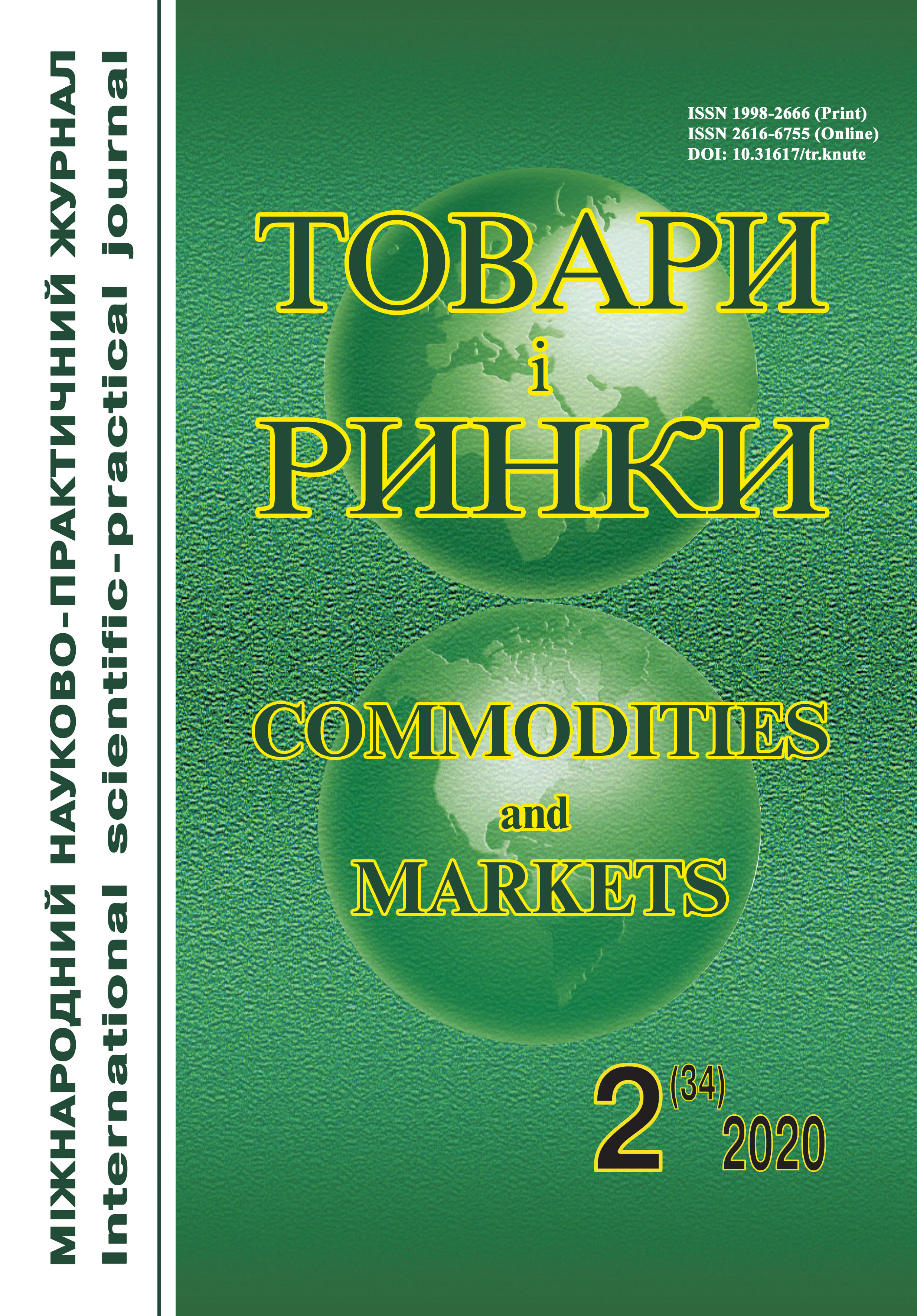Formation of quality of milk analogue from Greek fenugreek seeds
DOI:
https://doi.org/10.31617/tr.knute.2020(34)09Keywords:
plant-based milk analogues, fatty acid composition, drink, quality, amino acid composition taste, smell, consumer, Maillard reactioAbstract
The impact of heat treatment on the chemical composition of fenugreek seeds is analyzed. Tests of its amino acid composition and the content of mono- and disaccharides show that the Maillard reaction does not result in essential changes in the taste and aromatic properties of the raw material. It is found that heat treatment changes the fatty acid composition of the seeds, with reducing the quantity oflinoleicacid which enzymatic oxidation forms the compound 1-octen-3-olthat may cause the mushroom-specific smell of the seeds.
References
Fedorova, R. A., & Ponomarenko, V. M. (2014). Izucheniye vliyaniya beloksoderzhashchey dobavki na kachestvo pshenichnogo khleba iz muki s ponizhennymi khlebopekarnymi svoystvami [Testing the impact of a protein containing additive on the quality of wheat bread made of the flour with the reduced baking properties]. Izvestiya Sankt-Peterburgskogo gosudarstvennogo agrarnogo universiteta – News of St. Petersburg State Agrarian University, 37, 40-43. Retrieved from https://cyberleninka.ru/article/n/izuchenie-vliyaniya-beloksoderzhaschey-dobavki-na-kachestvo-pshenichnogo-hleba-iz-muki-s-ponizhennymi-hlebopekarnymi-svoystvami/viewer [in Russian].
Tangyu, M., Muller, J., Bolten, C. J., & Wittmann, C. (2019). Fermentation of plant-based milk alternatives for improved flavour and nutritional value. Applied Microbiology and Biotechnology, 103, 9263-9275 [in English].
Grimble, R. (2005). Fatty acid profile of modern lipid emulsions: scientific considerations for creating the ideal composition. Clin. Nutr. Suppl., 1, 9-15 [in English].
Al-Jasass, F. M., & Al-Jasser, M. S. (2012). Chemical Composition and Fatty Acid Content of Some Spices and Herbs under Saudi Arabia Conditions. Scientific World Journal, 859-892. URL: https://www.ncbi.nlm.nih.gov/pmc/articles/PMC3540753 [in English].
Moneim, A. E. S., Ali, O. A., & Hemavathy, J. (2008). Lipid content and fatty acid composition of fenugreek (Trigonella foenum-graecum L.) seeds grown in Sudan. International Journal of Food Science & Technology, 43 (2), 380-382 [in English].
Beyzi, E., Şafak, E. K., Gürbüz, P., Koşar, M., & Gürbüz, B.(2020). Fatty Acid Composition, Diosgenin and Trigonelline Contents of Fenugreek (Trigonella foenum-graecum): Effects of Phosphorus Fertilizer. Plant Biosystems – An International Journal Dealing with all Aspects of Plant Biology. Retrieved from https://www.tandfonline.com/doi/abs/10.1080/11263504.2020.1769216?journalCode=tplb20 [in English].
Bienkowski, T., Zuk-Golaszewska, K., Kaliniewicz, J., & Golaszewski, J. (2017). The content of biogenic elements and fatty acid composition of fenugreek seedscultivated under different condition. Chilean journal of agricultural research, 77 (2), 134-141 [in English].
Rahman, M. M., Ullah, O., Huq, E., & Khan, W. (2019). Analysis of Fatty Acid Composition and Physicochemical Characteristic of Trigonella foenum-graecum Linn Ripe Seed by Gas Liquid Chromatography. Malaysian Journal of Chemistry, 221 (1), 24-28 [in English].
Feyzi, S., Varidi, M., Zare, F. et al. (2015). Fenugreek (Trigonella foenum-graecum) seed protein isolate: extraction optimization, amino acid composition, thermo and functional properties. J Sci Food Agric, 95 (15), 3165-76 [in English].
James, R. (1976). Instruction manual single-column amino acid analys. California, USA: Durrum. Chemical Corporation Printed [in English].
Kozarenko, T., Zuyev, S., & Mulyar, N. (1981). Ionoobmennaya khromatografiya aminokislot (Teoreticheskiye osnovy i praktika) [Ion-exchange chromatography of amino acids (theoretical foundations and practice)]. Novosibіrsk: Nauka [in Russian].
Ludwiczuk, A., Skalicka-Woźniak, K., & Georgiev, M. I. (2017). Terpenoids. Pharmacognosy, 233-266 [in English].
Tangyu, M., Muller, J., & Bolten, C. (2019). Fermentation of plant-based milk alternatives for improved flavour and nutritional value. Applied Microbiology and Biotechnology, 103, 9263-9275. doi: 10.1007/s00253-019-10175-9 [in English].
Jiang, S., Cai, W., & Xu, B. (2013). Food quality improvement of soy milk made from short-time germinated soybeans. Foods, 2, 198-212. doi: 10.3390/foods2020198 [in English].
Udeozor, L. O. (2012). Tigernut-soy milk drink: preparation, proximate composition and sensory qualities. International Journal of Food and Nutrition Science. (Vol. 1). (Issue 4), (pp. 18-26) [in English].
Skulska, I. V., & Tsisaryk, O. Y. (2014). Vmist vilnykh aminokyslot brynzy v zalezhnosti vid skladu mikrobialnoi kompozytsii [The content of free amino acids of brynza cheese depending on the microbial composition]. Naukovyi visnyk LNUVMBT imeni S. Z. Gzhtskoho – Scientific bulletin of Stepan Gzhytskyi National University of Veterinary Medicine and Biotechnolog Lviv. (Vol. 16). (Issue 3 (60), (pp. 152-160) [in Ukrainian].
Jeewanthi, R. K. C., & Paik, H.-D. (2017). Modifications of nutritional, structural, and sensory characteristics of non-dairy soy cheese analogs to improve their quality attributes. Journal of Food Science and Technology, 55, 4384-4394[in English].
Bilkovi rechovyny [Protein substances]. Retrieved from https://chemeducation.pnu.edu.ua/wp-content/uploads/sites/14/2020/02/%D0%9B%D0%B5%D0%BA%D1%86%D1%96%D1%8F_1.pdf [in Ukrainian].
Kozulko, G. (2009). Iz chego sostoit gribnoy zapakh? [What is the composition of mushroom smell?]. Retrieved from https://bp21.livejournal.com/65841.html [in Russian].
Soyevyye kompozitsii s uluchshennymi organolepticheskimi svoystvami I sposoby ikh polucheniya [Soya compositions with improved organoleptic properties and methods of their obtaining]. (2008). Retrieved from https://patentimages.storage.googleapis.com/a5/1f/52/50b142fb44866e/RU2375917C2.pdf [in Russian].



